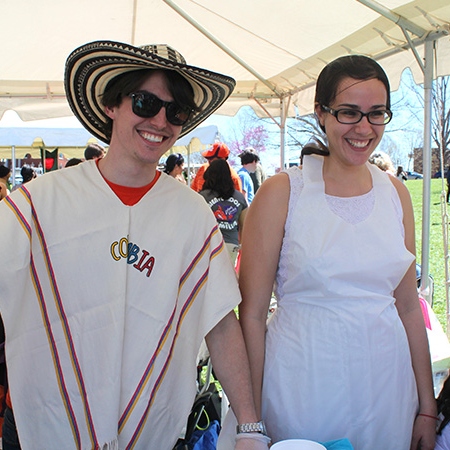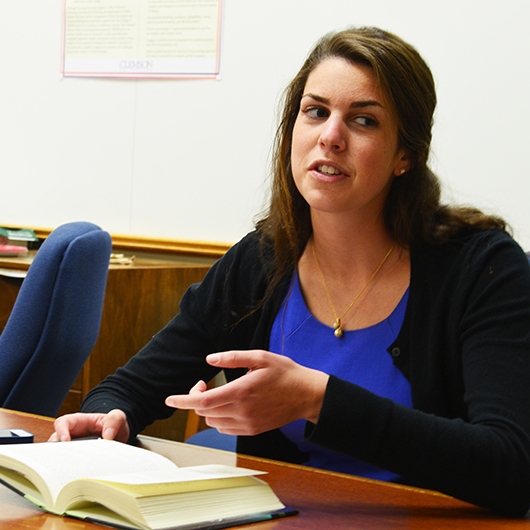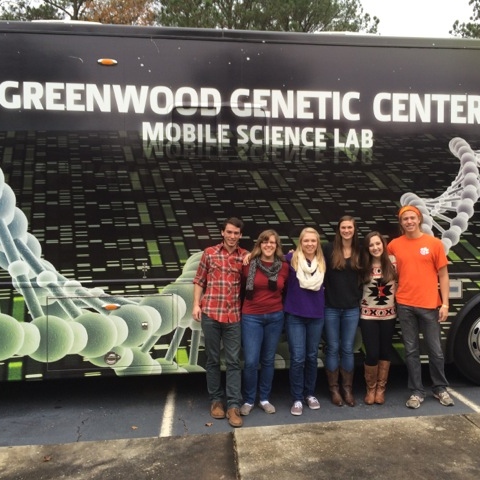Culinary Tourism: Food for Thought
Flashback to childhood and explore the events that made your hometown unique, whether they were festivals or fairs, visiting attractions or frequent showcases. For many, these fond memories include recollections of the distinctive cuisine such events were known for.
Over the past three semesters, Parks, Recreation and Tourism Management (PRTM) students on the Culinary Tourism Creative Inquiry team have traveled to and studied local food festivals around South Carolina while, of course, experiencing the unique fare each has to offer. The team is led by graduate student Jen Calabria, Dr. William Norman, and Dr. Teresa Tucker in PRTM.
From the Low Country Cajun Festival of James Island and the World Grits Festival of St. George, to the Rice Festival of Walterboro and the BBQ and Shag Festival of Hemingway, each South Carolina food festival provides students with hands-on experience in the interviewing and research styles used in the parks, recreation and tourism fields.
“We’re doing something that I think, out in the real world, a consultant would be paid to do. Because we have three semesters to do this, we’re producing a really high quality product, and the students are getting to see how much work it takes and what the expectations are, not just for school, but if they wanted to go into tourism research,” Calabria said.
Senior Jessica Kicklighter, a member of Culinary Tourism for two years, commented on her exposure to tourism research and the impact the creative inquiry has had on her professional skills.
“We developed our own research question and were in charge of developing a way to collect data,” she said. “We contacted festival coordinators, volunteers and prominent members of the community where the festivals were being held. We had to represent Clemson well and represent our Creative Inquiry well. We set up interviews and gathered information from these individuals over the phone and via email. My formal communication skills and interview skills have definitely improved as a result of my Creative Inquiry experience.”
At each local festival, students explored the perceptions of the residents in the area through in-depth interviews.
“It was interesting to watch the students evolve through the interviewing process at each festival, going from being fairly timid at the beginning, to having much more confidence at the end,” Calabria said. “I really enjoyed watching them become engaged with the people they were talking to and what they were doing.”
When it came to the locals at each festival, students were interested to find out their perceptions of food festivals and to explore what made the festivals ‘local.’ Surprisingly, students found that the main attraction of each festival was not the tasty treats.
“The localness of these festivals comes with the fact that the residents who attend them have been doing it for 25 years. They go to see their friends, and their families come back to these festivals because it’s a habit; they’ve always done so,” Calabria said. “As an outsider, you may not be part of the localness, nor might you be able to identify it unless you were like us and you were asking questions. The social component is what’s local.”
Taking on an outsider’s perspective has allowed students to stand in the shoes of a tourism manager, to experience the type of research that goes into developing and improving events.
With the research compiled from each festival, students created reports that were sent to the festivals to suggest areas of improvement. Aside from enjoying amusement rides, funnel cakes, crafts and festival cuisine, students in Culinary Tourism craft a real world product that explores the unique aspects that define the festivals that make hometowns unique.
“They’ve had to interact with people who are running festivals. They’ve had to come up with a plan to get something done, and then execute that plan. They’ve had to step out of their comfort zone to ask people if they would allow them to be interviewed, and then deal with that interview, whichever path it should go down,” Calabria said. “It’s a lot of real world experience.”



